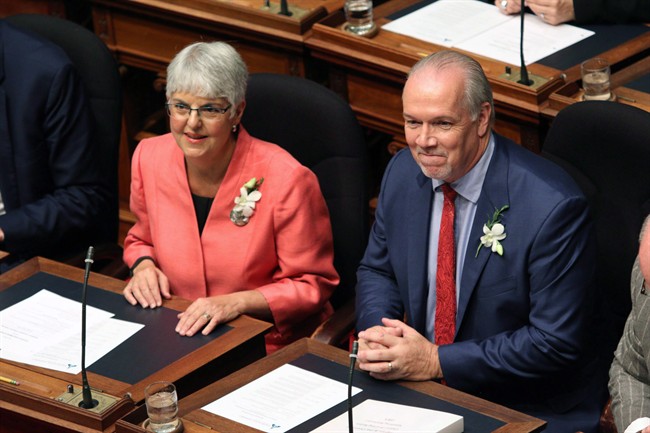It’s the kind of decision that will prove to be a defining moment for the young BC NDP government: whether or not to complete construction of the Site C dam.

And it’s apparently turning into a devilishly difficult decision to grapple with. The government caucus met all day and into the night on Tuesday discussing the project, and the cabinet did likewise all day Wednesday.
Coverage of Site C on Globalnews.ca:
Yesterday, I sat outside the cabinet chamber watching cabinet ministers come and go during breaks from the meeting. Key officials from the energy, finance and transportation ministries were also summoned to the meeting.
After the meeting, I prowled the deserted legislature corridors, hoping to buttonhole ministers and senior staff on their way home after a long day and gain some clues about which way the government was leaning regarding Site C.
READ MORE: BC Greens launch 11th-hour offensive against Site C dam
I was told by various folks that no final decision has been made and that the ball is now in Premier John Horgan’s court. The caucus and cabinet meetings held good discussions, and the sense is that a “pragmatic” decision will be announced either Friday or perhaps Monday.

Get daily National news
I’ve been doing lots of tea leaf reading, trying to gauge the future and where the NDP government is ultimately headed on this.
Some points to ponder:
- If cancellation causes BC Hydro rates to increase by more than 10 per cent (something that the power authority said would happen), what would that do to the NDP’s mission to make life more affordable for people?
- Does completing the dam significantly damage relations with First Nations? Some First Nations have signed economic benefit packages connected to the dam, while two First Nations have threatened lawsuits if the dam goes ahead.
- Which path is more politically sound for the NDP to take? Cancellation would endear it to environmental activists and many First Nations. Completion would be warmly greeted by private sector unions and most of the business community.
- Can the NDP risk cancelling Site C while also opposing the other big energy project – the Kinder Morgan pipeline expansion?
- Finally, and perhaps most tellingly, the deputy energy minister, Dave Nikolejsin, said in a speech last week that B.C.’s power demand will grow by 10,000 gigawatts by 2050, which is the equivalent of the output of two Site C dams. He also said there will be an aggressive push to have about 300,000 clean-energy vehicles on B.C.’s roads by 2030, and that Alberta and western U.S. states could be new markets for Site C power. So new electricity supplies will be needed.
It’s interesting to consider that Nikolejsin spent considerable time in the cabinet meeting briefing ministers. Other officials familiar with, and presumably supportive of, the Site C project also sat in.
If the government was planning to kill the dam, it strikes me as unlikely that they would have senior civil servants — who have spent years working on the assumption the dam was going to be completed — spend hours meeting with caucus and cabinet.
As well, the NDP government is slowly displaying evidence that it has embraced the role of government, and is trying to shed the role of being an activist opposition party.
READ MORE: Can there be a good ending for the Site C dam?
Energy Minister Michelle Mungall, for example, has defended the practice of “fracking” to extract natural gas, a practice that activists have long opposed.
Environment Minister George Heyman, a one-time ardent foe of fracking, is not talking like an environmental protester anymore. He’s talking like a minister of the Crown, as are other long-time opposition critics like Health Minister Adrian Dix, Finance Minister Carole James and Solicitor-General Mike Farnworth, to name a few.
So it’s not hard to envision one-time anti-Site C folks in cabinet starting to view the project through a different lens, especially when you consider that cancelling the dam could jack up BC Hydro rates by a significant amount.

Still, there is no question that there’s significant opposition to the dam in the NDP caucus room.
But I’ve seen no evidence that it represents the majority of opinion on the project. And I doubt any NDP MLA is going to quit the caucus over this issue and risk another election and a potential win by the BC Liberals, who strongly support the dam.
The decision on whether to proceed with Site C is a defining one for this government because it will reveal whether it has indeed shed the cloak of activism it wore so long in opposition. The NDP government of the 1990s made difficult decisions that infuriated their activist supporters, especially those in the environmental movement.
And I think those tea leaves suggest the new NDP government is about to do the same. As decision time draws closer, more signs seem to be pointing towards completing the dam rather than walking away.












Comments
Want to discuss? Please read our Commenting Policy first.